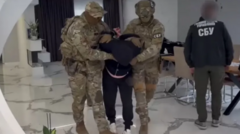As Xi Jinping affirms the strength of Sino-Russian relations during a recent visit to Moscow, experts caution that the alliance is not without its complexities. While both leaders advocate for a united front against U.S. dominance, Xi carefully navigates the relationship to maintain diplomatic ties with other global partners, mindful of the pitfalls of a too-close association with an isolated Russia.
Balancing Act: Xi’s Calculated Distance from Putin Amidst Unwavering Cooperation

Balancing Act: Xi’s Calculated Distance from Putin Amidst Unwavering Cooperation
Chinese President Xi Jinping publicly displays solidarity with Russian President Vladimir Putin, yet remains cautious in deepening ties, striking a balance to avoid potential diplomatic fallout.
Chinese President Xi Jinping recently attended Moscow's Victory Day parade, showcasing a strategic alignment with Russian President Vladimir Putin, while carefully maintaining political distance. Seated beside Putin, Xi projected unity, describing their bilateral bond as "unbreakable" and referring to both nations as "friends of steel." This visit marks Xi's 11th trip to Russia since he took office in 2013, highlighting a relationship characterized by personal closeness yet fraught with underlying tensions.
Experts suggest that while Xi and Putin emphasize their partnership, it is essential to recognize the complexity of their alliance. Mathieu Boulegue from the Center for European Policy Analysis indicated that their relationship oscillates between camaraderie and competition, bringing into question the true nature of their alliance. As global dynamics shift, Xi must tread carefully to ensure that the Sino-Russian friendship does not jeopardize China's outreach efforts to other nations, particularly in Europe, as it strives to counterbalance the United States.
Xi's cordiality in Moscow comes at a time when Russia faces significant international isolation due to its actions in Ukraine. Beijing's economic backing of Moscow evokes scrutiny, complicating Xi's international posture, particularly as China seeks to enhance its standing as a global partner. Reports indicate Xi's attempts to engage with European leaders, with recent communications commemorating five decades of bilateral relations, reflecting a desire to fortify ties outside of his relationship with Russia.
USA-China relations are also a critical consideration, especially with the specter of Trump's past overtures to Putin looming large. Xi's diplomatic messages, warning against potential efforts to sow discord between the two nations, underscore his intent to present a united front against perceived U.S. hegemony. Still, as China flourishes as a superpower, analysts caution that Russia's weakened position may shift the power dynamics within their partnership, suggesting that the Kremlin now relies heavily on support from Beijing.
Despite the smiles, handshakes, and moments of emotional camaraderie displayed at public events, experts point to rising tensions and sources of conflict that could emerge as Xi and Putin navigate an increasingly complex geopolitical landscape in the years ahead.





















